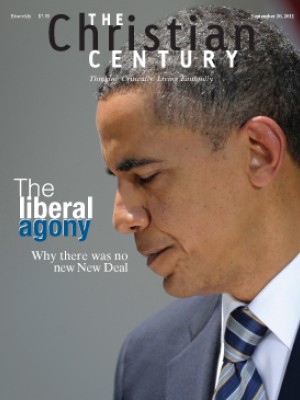Ill will toward Muslims remains ten years later
In a post-9/11 bid to better relations with Muslims, pastor Bob
Roberts invited Muslims to his NorthWood Church in Keller, Texas, for
Q&A sessions and a cooking club and to help on a few home remodeling
projects. The result: Roberts lost "a bunch of church members," he
said.
In Denver, pastor Max Frost asked volunteers from his Roots
Vineyard church to help paint a local mosque. Friends and family told
him it was a bad idea.
And at Hillsboro Presbyterian Church in
Nashville, Tennessee, Nancy McCurley started an interfaith scripture
study with Muslims, only to be told by a critic that "in a year's time,
this church will be a mosque."
In the ten years since the 9/11
terrorist attacks exposed the deep divide between America's
Judeo-Christian majority and American Muslims, a host of projects have
tried to foster interfaith understanding.
To be sure, there have
been signs of hope for the future of interfaith relations. But along
with progress has come polarization: threats of Qur'an burnings,
protests of proposed mosques and fears of Islamic law entering the U.S.
legal system.
Read our latest issue or browse back issues.
A month after the 9/11 attacks, an ABC News/Washington Post
poll found that 47 percent of Americans had a favorable opinion of
Islam. By 2010, that figure had only gotten worse, dropping to 37
percent. Which raises the question: Has the flurry of activities aimed
at interfaith understanding actually accomplished anything?
Eboo
Patel, founder of the Chicago-based Interfaith Youth Core, said the
furor over the proposed Park51 Islamic cultural center near Ground Zero
highlighted the need to gauge the quality, not just quantity, of
interfaith efforts.
"Tens of thousands of people in the country
who were participating in interfaith projects basically were watching
this on TV, . . . saying what difference does our work make on a
national level?" said Patel, who is Muslim.
As activists like
Patel push to foster meaningful relationships between Islam and other
faiths, there has been pushback from groups that have no interest in
such relations or that question aspects of Islam.
Gustav Niebuhr, author of Beyond Tolerance,
said the divide reflects three types of Americans—the pro-interfaith
crowd, the anti-Muslim segment and the "don't-know-too-much middle" that
can be swayed by either side.
Recently, the two poles have
debated the possible influence of Shari'a, or Islamic law, even though
there has been no concerted effort by American Muslims to introduce it
into American courtrooms. "The problem is when people think of Shari'a,
the only image that comes to mind is the Taliban stoning some poor woman
to death in Afghanistan," said Niebuhr, a professor at Syracuse
University. "That's the outer limit."
In a growing circle of
evangelical churches, there has been a sort of reverse pushback by
leaders who are turned off by fellow Christians trying to block mosque
construction and blaming Islam for 9/11.
Joseph Cumming, an
evangelical minister who directs the Yale Center for Faith and Culture
Reconciliation Program, said more evangelicals are asking what Jesus
would do when it comes to relating to Muslims. "There's a hunger in
churches to ask that question," he said. "That wasn't being asked before
9/11."
Mahan Mirza, vice president of academic affairs at Zaytuna
College, a new Muslim school in Berkeley, California, said
Christian-Muslim relations are generally better on the local level,
where he has seen an increase among evangelicals who think the Bible
requires such outreach.
"Sometimes that's couched in the language
of love your enemy so . . . it's not done in spite of Christian
teachings; it's done because of Christian teachings," said Mirza, a
former professor at the University of Notre Dame.
Last year, Rick
Love started Peace Catalyst International in Chandler, Arizona, which
has sponsored dinners with members of a local mosque and his Vineyard
church to foster what he calls "Jesus-centered peacemaking communities."
He cautions fellow evangelicals to be humble before criticizing the
harsh punishments demanded by others' scriptures: "I praise God that we
don't live under the Old Testament," he said.
Yet some evangelical
leaders, including Southern Baptist executive Richard Land, have been
condemned for reaching out to Muslims. "Southern Baptists were
comfortable with me advocating that Muslims have the right to have
mosques," said Land, who supported a proposed mosque in Murfreesboro,
Tennessee. "What they were not comfortable with was me being part of a
coalition that was filing a suit in order for them to have these
mosques."
Suhail Khan, a Muslim member of the advisory council of
the interfaith Buxton Initiative, said he is alarmed by Americans'
declining favorable views of Muslims.
He blames a "cottage
industry of hate" for the shift and finds himself answering more
questions about Shari'a than about the basics of what Muslims believe
when he visits evangelical churches. "I'm having to undo all kinds of
misinformation and very hateful misinformation," said Khan.
Undeterred,
Patel puts much of his hope in the 200 colleges and
seminaries—including nine evangelical schools—that participated in a
recent White House event kicking off yearlong interfaith service
projects. He expects that many of the students will eventually launch
similar projects at companies and in cities where they move after
graduation.
"I think that college campuses are going to be models
of interfaith cooperation, and I think they're going to graduate a
generation of interfaith leaders," he predicted.—RNS





